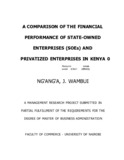| dc.description.abstract | In response to the financial burdens and budgetary constraints caused by SOEs
in many developing countries, the World Bank and the International Monetary
Fundadvocated privatization as a panacea to these economic problems.
In 1991, Kenya embarked on a comprehensive program to privatize 207 SOEs
and by 1996, 141 had been privatized. However, the process has slowed down
as the new NARC government maintains that it will take time to restructure the
SOEs before privatizing them.
The main objective of this study was to determine whether privatised enterprises
perform better than public enterprises during the same period of time. The
profitability of the enterprises privatized by 1996 through public flotation of
shares was compared with that of SOEsduring the period 1996-2001 both years
inclusive. The rate of change in return on equity and return on assets over the
six year period for both groups were also compared, The differences in the
meanswere tested for significance using the t-test.
The findings of this study indicate that the return on equity of the Privatized
Enterprises is significantly higher by more than 80% that of SOEs. There is a
decline in the profitability of both the SOEsand the Privatized Enterprises over
the six year period. The return on equity of SOEsdecreasesat an average rate of
181.17% compared to the average rate of change in Privatized Enterprises of
11.77%, which is more than ten times. However, the difference is not significant.
The study concludes that the Privatized Enterprises have a significantly higher
return on shareholders' wealth than the SOEsover the six year period. Although
the rate of change in the return on equity for both groups is not significantly
different, the shareholders' wealth of Privatized Enterprises is more stable than
that of SOEs over the six year period.
Therefore, the study supports privatization and recommends that the Kenyan
government should pursue the process while creating the necessary conditions
for privatisation to achieve the expected economic development and growth. | en |

